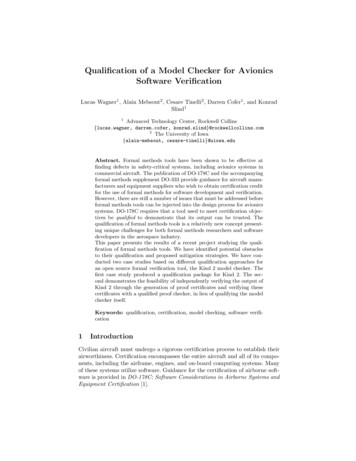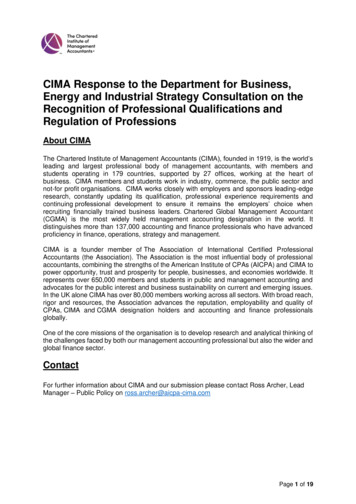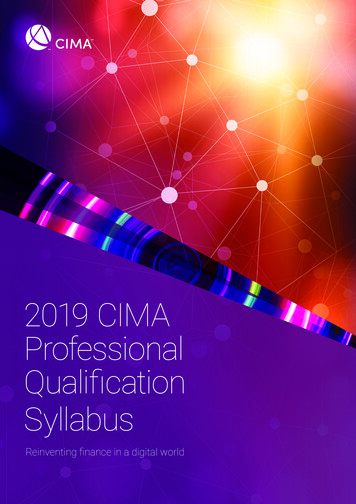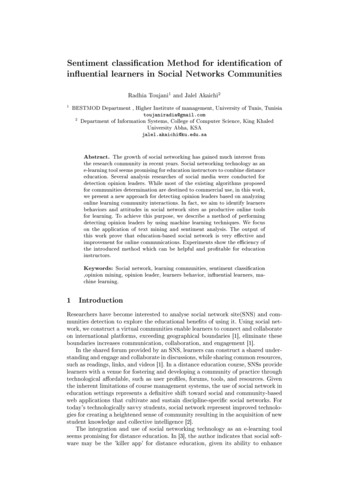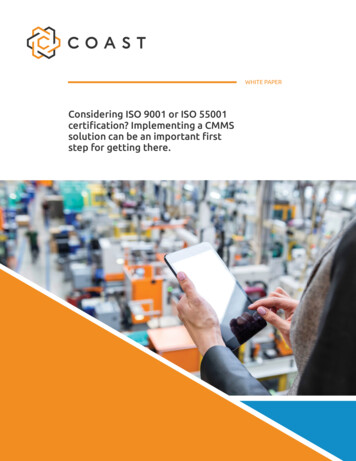
Transcription
CIMA enabled me toqualify without mountainsof student debt.Siân JonesThe Global Travel GroupThe CIMAProfessionalQualificationCIMA’s broaderbusiness focus isattractive to me.Ambrose CheungBarclays CapitalGetting startedThe CIMAqualification is wellrecognised internationallyand managementaccounting is a fastgrowing profession.CIMA is aboutlooking at the numbersand doing somethingabout them.Jonathan PowerIron MountainModupeola AdelowoFood Standards AgencySponsored bywww.cimaglobal.com/2010
STUDY WITH A LEADING CIMA-ACCrEDITEDQuality Partner CollegeAlso on Sale are BPP CIMA Books & Materials!SPECIAL OFFEr (T/Cs Apply):Up to 25%-OFF including Early Bird Discounts Up to 6 Months Installment Pay Plan Free 1st Time Pass or Full Refund Guarantee Free Exam Fee Remittance ServiceLIMITED OFFER FOR 1st 20 NEW STUDENTS:Quote CIMACG12/13GET FREEQUOTES/ENROLTODAY!www.charterquest.co.zaChoose Sandton or Braamfontein Campus and ed Home Study from Anywhere!Sandton . BraamfonteinLeaders in Professional Accounting,Treasury & Finance EducationSandton Tel.: 27 (0)11-656-2625 2597Braamfontein Tel 27 (0) 11-403-0642 0656Email: enquiries@charterquest.co.zaWebsite: www.charterquest.co.za
Welcome to CIMAWelcome to the CIMA Professional Qualificationwww.cimaglobal.com/2010This welcome pack provides every new CIMA student with an overviewof the qualification and the support available to help you make your firststep on your journey towards the CIMA Professional Qualification.ContentsThe CIMA Professional Qualification2Study methods5Study support from CIMA6Guidance notes by paper8Planning your studies9Your first CIMA exam10Be part of CIMA’s interactive network11CGMA – the new global designation12Questions and answers13The CIMA Professional Qualification1
The CIMA Professional QualificationThe CIMA Professional Qualification is made up of three learning pillars: enterprise, performance andfinancial. Each learning pillar is divided into three progressive levels: operational, management andstrategic (refer to the diagram below).Professional examinations are three hours long, with a further 20 minutes reading time at thebeginning of the exam. The pass mark is 50%. Currently, all examinations are paper-based, with the T4part B Case Study Examination also available on PC.Within each pillar, you are advised to study and pass the operational level papers before undertakingthe management level papers. You can choose how many papers you take at each sitting whenstudying these two levels.All operational and management level subject examinations must be successfully completed beforeattempting strategic level papers.All three strategic level subjects must be studied at the same time, as CIMA requires you to take allthree exam papers together at the first sitting of this level.AWARD - Member of the Chartered Institute of Management Accountantsof ofProfessionalT4Test- TestProfessionalCompetence in Management AccountingPart AInitial Professional Development – work-based practical experienceStrategic levelEnterprise pillarPart BCase Study Examination based on pre-seen and unseen materialPerformance pillarFinancial pillarPAPER E3 - ENTERPRISE STRATEGYPAPER P3 - PERFORMANCE STRATEGYPAPER F3 - FINANCIAL STRATEGY· Analyse corporate environment (internal/external)· Evaluate strategic options· Manage change· Design and run performance management systems· Evaluate and manage business risk· Manage financial risk· Review, audit and evaluate risk control systems· Apply risk management to IT/IS environment· Formulate and evaluate financial strategy· Conduct business or corporate valuation· Model and forecast cash flows and other finances· Advise on mergers, acquisitions and divestmentsManagement levelAWARD - CIMA Advanced Diploma in Management AccountingPAPER E2 - ENTERPRISE MANAGEMENTPAPER P2 - PERFORMANCE MANAGEMENTPAPER F2 - FINANCIAL MANAGEMENT· Analyse competitive environment· Plan, set up, manage and execute projects· Lead the team· Negotiate and communicate effectively· Advise on product manufacture and pricing· Plan and manage cost for competitive advantage· Design and manage budgeting system· Evaluate performance of organisational units· Prepare group accounts· Evaluate and apply IFRS· Analyse and interpret financial statements· Prepare CSR reportsOperational levelAWARD - CIMA Diploma in Management AccountingPAPER E1 - ENTERPRISE OPERATIONSPAPER P1 - PERFORMANCE OPERATIONSPAPER F1 - FINANCIAL OPERATIONS· Awareness of IT/IS issues and environment· Awareness of key marketing issues· Awareness of efficiency and quality issues· Awareness of people management· Calculate and analyse cost of products· Forecast and budget for organisational activities· Evaluate capital expenditure· Manage short-term finance (e.g. cash)· Prepare basic tax computations· Prepare financial statements for single company· Use IFRS and GAAP· Manage general and other ledger systemsCIMA CERTIFICATE IN BUSINESS ACCOUNTINGPaper C01 - Fundamentals of Management Accounting Paper C02 - Fundamentals of Financial Accounting Paper C03 - Fundamentals of Business MathematicsPaper C04 - Fundamentals of Business Economics Paper C05 - Fundamentals of Ethics, Corporate Governance and Business Law2The CIMA Professional Qualification
The fourth and final level (T4) relates to professional competence. To become a CIMA member,students must demonstrate three years of relevant work-based practical experience (T4 part A) andpass the case study (T4 part B).See our ‘Guidance notes by paper’ section on page 8 where we direct you to specific resources for eachpaper.On completion of all three operational level papers, students are awarded the CIMA Diploma inManagement Accounting. The CIMA Advanced Diploma in Management Accounting is awarded whenstudents complete all six operational and management level papers. Certificates are posted within sixweeks of the exam results and we will also publish your details on the website providing you have optedin to do so – check your communication preferences in MY CIMA www.cimaglobal.com/mycimaUnderstanding the syllabusThe syllabus for each paper contains: Lead and component learning outcomes which demonstrate what our students ‘can do’ once theypass that subject. Indicative syllabus content.A component learning outcome has two main purposes: To define the skill or ability (referred to as ‘learning objective’) that a well-prepared candidate shouldbe able to demonstrate in the examination. To demonstrate the approach likely to be taken by examiners in examination questions.The learning outcomes are part of a hierarchy of learning objectives (Figure 1). ‘Knowledge’ is level 1(the lowest level) and the highest level is ‘evaluation’, which is level 5. The verbs used at the beginningof each learning outcome relate to one of the specific learning objectives.Figure 1 – Learning objectives (skill or ability that a well-prepared candidate is expected todemonstrate)Level 5 - evaluationLevel 4 - analysisLevel 3 - applicationLevel 2 - comprehensionLevel 1 - knowledgeThe CIMA Professional Qualification3
Example from E2 (Enterprise Management) syllabusComponent learning outcome – Discuss the value of post-completion audit.The verb ‘discuss’ is level 4 (analysis) in the learning objective hierarchy. An examination questionbased on this component learning outcome could use one of the verbs from level 4 (analysis),level 3 (application), level 2 (comprehension) or from the lowest level 1 (knowledge) but a higherlevel verb (in this instance, level 5) will not be used to test this component learning outcome.Study weightingsWithin each subject, a percentage weighting is shown against each section topic. This can be used asguidance on the: proportion of study time required by each topic approximate proportional distribution of marks across section topics.It’s essential you study all the topics within the syllabus, since any single examination question mayexamine more than one topic.4The CIMA Professional Qualification
Study methodsThe CIMA qualification can be studied in a variety of ways.Blended learningBlended learning offers the effectiveness of face-to-face tuition together with the flexibility of distancelearning. An example of this would be a distance learning course followed by a taught revision course.CIMA LearningQuality Partner colleges have been assessed by CIMA and provided evidence that they can meet allof our performance requirements. Where possible, we recommend that all students attend a QualityPartner college. Further information regarding the CIMA Learning scheme is available at-to-expectColleges which are unable to meet the criteria for Quality Partner, but have committed to our deliveryguidelines, will be listed on our college list. At this level we have not formally assessed the quality oftuition provided by these colleges, so we strongly advise you to carry out your own research beforeattending a course.CIMA Learning does not currently extend to ‘online only’ course providers.Home/self-study with official CIMA textbooksThis is the most cost-effective method with which to study the CIMA qualification, the only study costsbeing your books and exam fees. Home study does require high levels of discipline and self-motivation.The official CIMA textbooks can be purchased from www.cimapublishing.com or for a list of localCIMA publishing booksellers, please contact the Johannesburg office.Taught courseYou can follow a taught course with one of the many colleges globally which teach CIMA. The CIMALearning college list at www.cimaglobal.com/colleges will show you a list of colleges in your areawhich provide tuition for the CIMA qualification in varying degrees, whether it is tutor support whenstudying at home or full taught classes which are either full/part-time, evening/weekend or block basis.Please note, not all providers listed will offer every option. For information on fees, please contact thetuition provider you wish to study with.Distance learningIf you would like to choose when and where you study, but would also benefit from some tutor supportthen distance learning may be the option for you. To find CIMA Learning colleges that offer distancelearning courses, visit CIMA’s college list at www.cimaglobal.com/collegesOptions for distance learning include traditional textbook based, virtual classroom, e-learning or acombination of all three.The official CIMA online resource is CIMAstudy.com. It is ideal for students in areas where there islittle or no tuition provision, or for those who prefer to self-study at their own pace. Courses are nowavailable for operational, management and strategic level subjects. Visit www.CIMAstudy.com formore information and to view demonstration modules.The CIMA Professional Qualification5
Study support from CIMAA wide range of resources are available to download free from www.cimaglobal.com/2010These include: past-exam papers model answers post-exam guides, written by the examiner technical articles, written by examiners, tutors and industry experts study videos.SyllabusSpend some time analysing the syllabus for each subject you are studying. Each syllabus is divided intoa number of broad topics. The learning outcomes in the syllabus identify what you are expected to beable to do in the exam. The verbs used in the beginning of component learning outcomes demonstratethe level at which the examiner can ask a question based on a particular learning outcome.To help you with your studies, a full copy of the syllabus has been included as part of this welcomepack.Financial ManagementYou will regularly receive CIMA’s Financial Management magazine. This contains an informative mix offeatures, news and practical advice. Look out for the technical articles and exam notices in the studynotes section.VelocityVelocity is our global e-magazine for all CIMA students, which is sent out every two months. It containsnews, technical articles, case studies, study and career advice and exam notices.CIMAsphereCIMAsphere is our online community. It features a range of forums, groups, blogs, videos and liveevents, providing a platform for students to ask questions, share information, give advice and findexpertise and support among peers, CIMA members and alumni.You can also contact each other through the CIMAsphere web messaging service, organise events andfind study buddies. http://community.cimaglobal.comEthics and professionalismAt CIMA we help you to develop both your technical ability and your professional capacity. Yoursuccess is important to us. Once you become a member, the designatory letters (ACMA, CGMA/FCMA,CGMA) and chartered status denote your professionalism, practical experience, credibility and integrity,along with your commitment to ethics and CIMA professional development. Ethics is a key componentof being a chartered professional, enhancing both reputation, employability and ongoing earningpotential.6The CIMA Professional Qualification
In our annual survey, ethics and professional standards are deemed to be ‘the most important aspectof CIMA membership’. That is why ethical practice and understanding sits at the heart of the CIMAqualification and all members and students are committed to upholding the CIMA Code of Ethics. TheCode is globally recognised and offers a framework and set of principles for all to follow. CIMA’s Codeand supporting resource material for ethics helps provide useful guidance around ethical practice andresolving ethical dilemmas.Ultimately, ethics makes good business sense. See why ethics is important to your career andlong‑term business success www.cimaglobal.com/professional-ethicsThe CIMA Professional Qualification7
Guidance notes by paperWe have produced ‘guidance notes’ for all the professional qualification papers below. These containlinks to all study resources available from CIMA.Operational level:E1 enterprise operations (www.cimaglobal.com/guidancenotesE1)F1 financial operations (www.cimaglobal.com/guidancenotesF1)P1 performance operations (www.cimaglobal.com/guidancenotesP1)Management level:E2 enterprise management (www.cimaglobal.com/guidancenotesE2)F2 financial management (www.cimaglobal.com/guidancenotesF2)P2 performance management (www.cimaglobal.com/guidancenotesP2)Strategic level:E3 enterprise strategy (www.cimaglobal.com/guidancenotesE3)F3 financial strategy (www.cimaglobal.com/guidancenotesF3)P3 performance strategy (www.cimaglobal.com/guidancenotesP3)T4 level:T4 parts A and B (www.cimaglobal.com/guidancenotesT4)8The CIMA Professional Qualification
Planning your studiesFollow these tips and be prepared for the CIMA examinations. Do some research before choosing how you are going to study – make sure the option you choosewill suit you and the way you learn best. Read the syllabus for the paper you are studying, then create a study plan and a separate revision plan.Stick to your plans. Be realistic when creating your study and revision plans – set achievable targets but make sure thatyou will have time to cover everything. Keep a record of your progress against your plan. Be protective of your study time. Find yourself somewhere peaceful to study with no interruptions –if this isn’t possible at home, study at work or in the library. Put variety into your study sessions – spend some time reading your textbook, do a practicequestion, or read a related article from the CIMA magazine. Build review sessions into your study time to be sure that you fully understand what you are learning. Be honest about your strengths and weaknesses – avoid concentrating your studies on the areas thatyou are good at. Spend time tackling the areas that cause you problems. Do plenty of exam question practice and some full mock examinations – this preparation is essentialfor success in the CIMA examinations. Make use of all the study support available from CIMA. Studying can be very stressful, particularly around exam time. See our dedicated section for advicefrom CIMA students, staff and markers on how to keep anxiety at bay.Visit www.cimaglobal.com/studystressThe CIMA Professional Qualification9
Your first CIMA examWhat to expectCIMA examinations take place in a wide variety of venues and are held twice a year, in May andNovember. Examinations last for three hours, with an additional 20 minutes of reading time.Candidates may use electronic calculators in line with the conditions in the exam ruleswww.cimaglobal.com/examrulesHow to enterProfessional examinations are entered online using your MY CIMA account. Exam entry typically runsfrom early February to mid-March for May examinations and early August to mid-September forNovember examinations. Please visit the ‘Entry for professional level’ page on the CIMA website forfurther information and dates. Make sure you have read and understood the exam rules and regulationsbefore you book your examinations. For the latest examination fees, please visitwww.cimaglobal.com/feesExam centresYou can search for your nearest exam centre by town, country, or centre number. Please note you mustsit all your exam papers at the same centre for a particular sitting.Admissions adviceWe will email you when your admissions advice is available, usually four to five weeks before theexam. You will need to print it off, ensuring you have details for all papers you are sitting. Bring thisinformation with you to present to the invigilators at your exam centre. Log in to your MY CIMAaccount and select ‘My admission advice’ under ‘My examinations’ then print using the ‘Print this page’link.Attendance slip receiptsYou will receive an attendance slip for each exam you sit. The slips are confirmation of your examattendance and should be kept for at least four months after the examinations as proof of your sitting.ResultsResults for all paper based exams are sent out by first class post or airmail seven weeks after the finalexam. To receive your results by email on the same day, log in to your MY CIMA account at least oneweek before results day, and select ‘My personal details’ and then ‘My communication preferences’.10The CIMA Professional Qualification
Be part of CIMA’s interactive networkCIMA represents a community of students with a common interest – to enhance their employability bycompleting the CIMA Professional Qualification and becoming a Chartered Management Accountant.As a CIMA student, you can now be part of a local community with the ability to exchange views andexperiences with other students. More importantly, you can speak to other students about exams ordiscuss the papers afterwards. Some of the best study advice comes from real CIMA students, so it’sworth visiting and participating. Those of you who have completed the CIMA Certificate in BusinessAccounting may already be aware of some of the following platforms.CIMA’s online communityhttp://community.cimaglobal.comCIMA Student Support blogshttp://community.cimaglobal.com/blogsCIMA A Twitterwww.twitter.com/CIMA NewsCIMA LinkedInwww.linkedin.com/company/cimaLocal supportLocal support helps you to keep you in touch with changing legal and business requirements in yourarea. It also puts you in touch with news and events that can help you through the exams and applyingfor membership.CIMA Africawww.cimaglobal.com/Our-locations/Africa* local specific web pages also exist for Botswana, Ghana, Kenya, Malawi, Mauritius, Nigeria, SouthAfrica, Zambia, Zimbabwe.CIMA aCIMA Sri nka-members-professional-networkCIMA ity.cimaglobal.comThe CIMA Professional Qualification11
CGMA – the new global designationChartered Global Management Accountant (CGMA) is the global designation for managementaccountants, it’s powered by AICPA (the American Institute of Certified Public Accountants) and CIMA,two of the world’s leading accounting organisations.On completion of the CIMA qualification and becoming a CIMA member, you are automaticallyentitled to the CGMA designation. It will add global power to your CV, showcase your value around theworld and demonstrate your business acumen, ethics and commitment.As a CGMA you will benefit from: Being part of an online community – a global community of like-minded peers where you canconnect with the best minds in management accounting. Access to the tools, webinars, reports and research to challenge your thinking and keep you at theforefront of your profession.To find out more visit www.cgma.org12The CIMA Professional Qualification
Questions and answersQ: What is a contact ID?A: Your contact ID is your unique CIMA reference number. We give you a contact ID when you register as aCIMA student or create a web account and you can use it in conjunction with a password to access yourMY CIMA area and our discussion forums. You will find your contact ID on all correspondence we send you.Q: I’ve just completed the CIMA Certificate in Business Accounting qualification. When can I sitmy professional level examinations?A: If you want to sit the professional level examinations, you must have been awarded exemptionsfrom, or have passed, the certificate level papers by 1 March for May professional examinations or1 September for November examinations. It can take up to 20 working days to award exemptionsduring January/February and July/August peak periods.Q: How long will it take me to complete the qualification?A: There is no time limit to complete the CIMA qualification. On average, it takes a student who isworking full-time and studying part-time between three and five years to qualify.Q: How many times can I sit an examination?A: There is no limit to the number of attempts you may have at each exam.Q: Is there a time limit on completing my examinations?A: No. You can take as long as you want to complete the qualification. However, please note thesyllabus is updated on a regular basis (every five years) so you may need to refresh your knowledgewhen resuming your studies.Q: Can I study for 2010 syllabus examinations using 2009 books?A: We always recommend that students use the most up-to-date study material, as a syllabus updateis a major change. The 2010 syllabus study material is available for purchase from the CIMA Publishingwebsite or for a list of local CIMA publishing booksellers, please contact the Johannesburg office.Q: Am I entitled to any exam exemptions for previous study?A: To find out if you may be eligible for any exemptions from the CIMA examinations, please visitwww.cimaglobal.com/exemptionsQ: I hope to receive exemptions, when do I need to pay?A: If we award you any exemptions you will receive an email confirming this. You can view yourexemptions online using your MY CIMA account under ‘My exam history’. You are required to pay foryour exemptions within eight weeks of them being awarded, either online by credit/debit card or bysending us a cheque or bankers draft.Q: Do I get a certificate for my exemptions?A: We do not issue exemption certificates. An email will be sent confirming the exemptions you havebeen awarded and you can view your exemptions online using your MY CIMA account.If you choose to waive an exemption and then sit the exam and fail, you cannot reclaim the exemptionfor this paper.The CIMA Professional Qualification13
Q: How do I apply for a UK visa?A: We are not involved in visa applications. You need to contact the UK Border Agency for furtherinformation regarding visas.Q: I have an MBA or I’m a member of another accountancy body. What exemptions do I get?A: An accelerated route may be available to MBA holders and members/those who completed theexams of other professional accountancy bodies. Upon completion of a gateway examination, you willreceive the CIMA Advanced Diploma in Management Accounting (CIMA Adv Dip MA) and be awarded11 exemptions from the CIMA examinations (out of a total of 15), allowing you to start studying atstrategic level.Q: Is there anyone I can come and see for advice on joining CIMA?A: The Johannesburg office is open from 8.30am to 4.30pm CAT. You can call us on 27 (0)11 788 8723/ 0861 CIMASA (0861 246272), email us at johannesburg@cimaglobal.com or visit us at 1st Floor,South West Wing, 198 Oxford Road Illovo 2196.Q: How do I get a job within management accounting? How easy is it to get a job?A: You can visit CIMA My Jobs to find out about job offers in your area and sector. This servicealso allows you to search for a graduate scheme. The careers advice section contains a wealth ofinformation for students and members looking to find a job as a management accountant. You canalso use our employer database to find out if your employer or prospective employer is registered withCIMA Training.Q: How do I get practical experience if I am not working within management accounting?A: You do not necessarily need to be working within management accounting in order to gain relevantwork experience. CIMA students and members have a wide range of jobs available to them, not all ofwhich are within finance or accountancy. Download the practical experience requirements fromwww.cimaglobal.com/per which will help you to determine whether your current job position allowsyou to gain the required basic, core and supplementary skills.Q: Where can I get the Q&As for past examinations?A: If you are a registered and active CIMA student or tutor, you can access examiners’ questionsand suggested answers free of charge using your MY CIMA account. Once logged in, select ‘Studentinformation’ on the right-hand side of your screen, then ‘Past exam questions and answers’.Q: Can I call myself CIMA part-qualified?A: No. Full completion of the CIMA qualification, including the practical experience requirement, isbroadly equivalent to a Master’s degree and has post-graduate status in the UK. Membership (ACMA,CGMA) is awarded when the full qualification, including the final test of professional competence, partsA and B have been successfully completed. CIMA does not use the term ‘part-qualified’.However, your progress through the examinations is rewarded at various stages, with the award of theCIMA Diploma in Management Accounting (CIMA Dip MA) on completion of all three operational levelpapers and the CIMA Advanced Diploma (CIMA Adv Dip MA) on completion of all six operational andmanagement level papers.14The CIMA Professional Qualification
These intermediate awards are a useful way of describing your progress and current skills andknowledge to employers.Q: How much can I expect to earn once I’m CIMA qualified?A:LEARN AND EARNYou can see how much you can expect to earn, and the qualifications you will get as you progress through the CIMA ProfessionalQualification syllabus. You can also see how your investment in studying and exams, which ranges from 500 to 3,000 at eachstage depending on how you wish to study, is quickly rewarded.START: R145,000**PER ANNUMSource: www.statssa.gov.zaR992,0000R779,374CIMA DIPLOMA INMANAGEMENT ACCOUNTINGCIMA ADVANCED DIPLOMA INMANAGEMENT ACCOUNTINGASSOCIATE CHARTEREDMANAGEMENT ACCOUNTANTFELLOW CHARTEREDMANAGEMENT ACCOUNTANT12 months.12 months. R212,626CIMA member FCMA, CGMA R332,554CIMA member ACMA, CGMA R39,763Strategic – T4 R52,361Management12 months.Operational R209,696R407,057CIMA CERTIFICATE INBUSINESS ACCOUNTINGR446,820R354,696Source: 2011 CIMA Salary SurveyQ: How do I contact CIMA?A: Our Johannesburg office is open from 8.30am to 4.30pm CAT Monday to Friday.T. 27 (0)11 788 8723 or 0861 CIMASA (0861 246272)E. johannesburg@cimaglobal.comPostal address:PO Box 745Northlands 2116Physical address:1st Floor, South West Wing198 Oxford RoadIllovoThe CIMA Professional Qualification15
Notes16The CIMA Professional Qualification
Chartered Institute ofManagement Accountants1st Floor, 198 Oxford RoadIllovo, Johannesburg, South AfricaPostal address:PO Box 745, Northlands 2116, South AfricaT. 27 (0)11 788 8723/0861 CIMA SAF. 27 (0)11 788 8724E. hafrica
the management level papers. You can choose how many papers you take at each sitting when studying these two levels. All operational and management level subject examinations must be successfully completed before attempting strategic level papers. All three strategic level subjects must be studied at the same time, as CIMA requires you to take all
